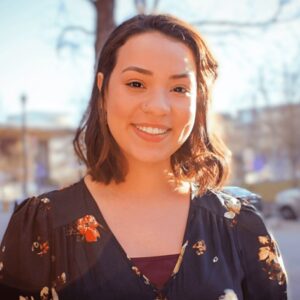The Graduate School has named Isabel Soberal as its 2023-2024 senior fellow with its Weiss Urban Livability Fellowship program. Soberal is a master’s degree student in the Department of City and Regional Planning, housed within the College of Arts and Sciences. Soberal came to the University of North Carolina at Chapel Hill as a Weiss fellow shortly after graduating from Grand Valley State University in Grand Rapids, Mich. where she studied geography and Spanish. In her role as senior fellow, Soberal will lead her peers in discussing and tackling issues pervading urban landscapes today.

What brought you to UNC-Chapel Hill?
The passion for the program here. UNC-Chapel Hill has a great planning department, and the people here are so talented and passionate about what they do. I really was just blown away during admitted students’ day, and I really wanted to be a part of it.
What led you to apply for the Weiss Fellowship at UNC-Chapel Hill?
The Weiss Fellowship was a huge factor in my decision to come to UNC-Chapel Hill. When I got the news that I had been awarded the fellowship, I thought they had the wrong person. So just having the opportunity to talk to folks in different disciplines seemed so cool to me, and it definitely has been. This past year has been so informative in trying to figure out how to approach issues with planning – called “wicked problems” – from a variety of perspectives.
What prompted you to apply for the senior position?
The main reason I applied for the senior fellowship was to see how I could bolster the program and make it even better than what it is already, which is going to be a tall order. I just wanted to continue to be a part of this. The Weiss’ influence in the arts and the arts community of Chapel Hill and Carrboro was a really big thing for me too. I’m very passionate about including the arts.
What is expected of the senior fellow?
On a weekly basis, you run the cohort. Eight students receive the fellowship every year, not including the senior fellow. You run bi-weekly seminars where we talk about indicators of urban livability and how to address some of the craziest problems that are facing our society today, so anything from climate change to homelessness and housing insecurity. Zari Taylor, my senior fellow from this year, was just so talented and amazing at leading these seminars every week. I remember the first meeting of the fellows in probably August or September of last year. You sit down with all of these people who are like the cream of the crop in their discipline. I was very intimidated! Our first seminar was learning about indicators of livability. We have a big list of everything from safety in public spaces to transportation and sanitation, everything you can think of as being a part of living in a city or just a community. We talk about: What are the problems? Who has access? Who does not have access? How might we work to solve the inequity? As a Weiss fellow, you’re put in a position to be able to ask more of these questions you get presented in the classroom but you’re able to think about them on a really deep level which is really rewarding. You’re able to see that you are actually making a difference by studying and contributing to academia — that the work that I do is important.
What opportunities has the Weiss Fellowship provided you with?
The interdisciplinary perspective is huge in the Weiss Fellowship, so being able to look at these problems from a perspective that you wouldn’t necessarily be exposed to in the classroom in your specific discipline. I would have never known, for example, the people who are studying religious studies and American studies, so getting to learn from them every week was so cool. It’s also really shined a light on the fact that no problem is siloed in the way that we think it is. There are so many different webs and underpinnings that come from a variety of perspectives. We have to be able to look at problems from all of those perspectives, or at least try. That was the opportunity I was most stoked about. Then there’s just the financial security and giving an opportunity to folks who may not have otherwise had that opportunity to study and focus on school without having to worry about making ends meet. I’m incredibly grateful for that.
How do you plan to shape the senior role?
I would really love to see even more of a focus – it’s already strong and robust – on the Carolina performing arts and just arts in communities in general. … I’m really looking forward to stepping into this role, because I’m really excited to kind of drive the arts perspective and see how we can make that even bigger and more robust.
What do you enjoy doing beyond your graduate studies?
I’d like to think I’m a very creative person. I do really enjoy making art. I love reading, writing, listening to music – I recently started collecting vinyl. So you’ll see me around trying to pick through Goodwill bins trying to find the good stuff. I’ve really been making a conscious effort this year to separate school and work, and that’s really paid off.
Where do you see yourself after graduation?
I think I’ll want to move back to Michigan and work in sustainability and community planning. I don’t know specifically what form that’s going to take just yet, but I know I want to reach for equity in all spaces. This is a wonderful opportunity.
—Kate Slate (MA ’23)
